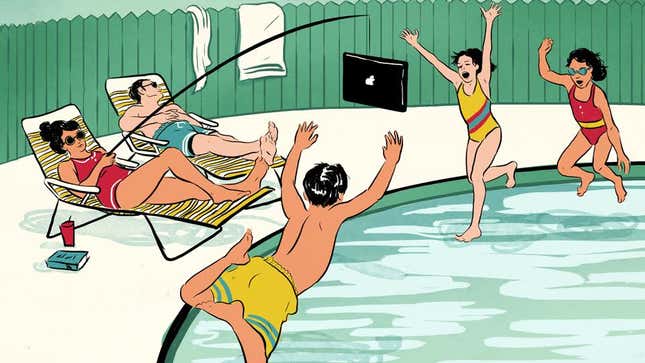How to Get Your Kid to Do Anything This Summer Except Look at a Screen
Latest

It’s summertime, and if you have a kid, you have to fill their time with something. Your first thought is probably to stick an iPad or Kindle in front of them because you can’t sing along to “Shake It Off” one more time without murdering someone—but the trouble is, the long arm of screen addiction is robbing our children of basic social functions. Time for a backup plan.
Over at the NYT Well blog, health reporter Jane E. Brody warns about the ways that screen time is taking its toll on our children. She writes:
While Internet addiction is not yet considered a clinical diagnosis here, there’s no question that American youths are plugged in and tuned out of “live” action for many more hours of the day than experts consider healthy for normal development. And it starts early, often with preverbal toddlers handed their parents’ cellphones and tablets to entertain themselves when they should be observing the world around them and interacting with their caregivers.
“Should be” is right! Should be is a noble, lofty goal, the stuff of every parent’s greatest ambitions for her child. Your kid should be sleeping 13 hours a night. Your kid should be walking by age 1. Your kid should be eating broccoli already, not Gummy Bunnies. Your kid should be not still so into your boobs still when she hasn’t nursed for three years but insists on pinching your nipples at least once a day and saying “milk bottle milk bottle.”
“Should be” is also every parent’s basic nightmare. The way we talk about parenting is a little bit fucked, because it lives in two extremes—the theoretical world we all know we should inhabit, and the real world with this kid you had, who is being pretty much how they are, doing the stuff they do that everybody else does, which is stuff we only have so much time and energy to be out in front of, stuff we only have so much power to rein back in once the wrong course is ahead.
There’s should be, and then there’s every day. That’s the truth of this world, the one none of us can really escape. Speaking of escape, though, kids and teens have been escaping into anything they can get their hands on for as long as hands have existed. I spent huge portions of my childhood glued to television watching whatever was on: Days of Our Lives, He-Man, MTV, Roseanne, or playing Legend of Zelda or Tetris bleary-eyed into the night, mainlining sugar, with virtually no supervision.
Here is where you expect me to say “And I turned out just fine,” like approximately one million nostalgic defenses of the free-range childhoods of yore. But I’m not going to say that. I certainly survived and even thrived, eventually, once I stopped escaping so much, but it wasn’t a particularly ideal way to experience the world, all told. I could’ve learned to play chess, or learned another language, or volunteered at a soup kitchen. Instead I saw The Exorcist at age 7.
To be clear, my childhood also included all the classic stuff we all romanticize, too, like playing outside all day during the summer until either someone tried to kidnap us or the cops were called because they saw us breaking into something. And what I “lost” in TV time, I made up for eventually by being into books, good movies, and art—but I highly doubt that any of that made me any more socially adept.
One thing that hasn’t changed, fascinatingly, between my generation and my daughter’s, is the fact that today—despite the influx of new devices—the majority of screen time for kids nowadays is still mostly experienced via television. Brody:
In its 2013 policy statement on “Children, Adolescents, and the Media,” the American Academy of Pediatrics cited these shocking statistics from a Kaiser Family Foundation study in 2010: “The average 8- to 10-year-old spends nearly eight hours a day with a variety of different media, and older children and teenagers spend more than 11 hours per day.” Television, long a popular “babysitter,” remains the dominant medium, but computers, tablets and cellphones are gradually taking over.
The effects on children, Brody notes, range from their school work and grades suffering, to their social skills being hampered, to them becoming immune to violence, to them behaving less empathetically, to some of them sounding like this kid:
-

-

-

-

-

-

-

-

-

-

-

-

-

-

-

-

-

-

-

-

-

-

-

-

-

-

-

-

-

-

-

-

-

-

-

-

-

-

-

-








































